 |
List of 50 Free Piano Lessons |
| A | B | C | D | E | F |
| G | H | I | J | K | L |
| M | N | O | P | Q | R |
| S | T | V | W |
A
Back to TOP
_________________________________________________
A Tempo
Returning to the original speed
Accent Sign (>)
Playing the note(s) louder.
Accidental –
The marking for a pitch, to be lowered (b or flat), or raised (# or sharp) by a half step.
Accompaniment
Instrumental or vocal parts that accompany a melody.
Adagio
Playing the music moderately slow
Allegretto
Playing the music moderately fast
Allegro
Playing the music fast
Andante
Playing the music slowly (at a walking pace).
Arpeggio –
Chords where the notes are played in succession instead of together.
B
Back to TOP
_________________________________________________
Bar
Organized chunk of time in music that contains a particular number of beats, usually two, three, or four beats. Another word for bar is measure.
Bar Line
Line used to separate bars/ measures of music.
Bass Clef
Musical symbol that is placed at the left side of a staff that makes a note placed on the second line from the top of the staff the F below Middle C. For this reason, it is also called the F clef.
C
Back to TOP
_________________________________________________
|
Music Theory for beginners Learn Scales, Chords, Intervals The Fundamentals Intro to Circle of Fifths www.zebrakeys.com |
Chord
Three or four notes play simultaneously. Learn chords for beginners.
Clef
Musical symbol that is located at the far left side of a staff. In piano music, two clef signs are used – the Treble (G clef), and the Bass (F clef).
Crescendo –
Playing the song while gradually getting louder.
D
Back to TOP
_________________________________________________
Dampers
Small, felt-covered pieces of wood that rest against the piano strings inside the piano. They lift when the key is struck so that when the damper returns to the string, it causes the string to cease vibrating.
Diminuendo
Playing the song while gradually getting softer
Dotted Note –
A note with a dot to the left of it. The dot next to a note adds 1/2 of that note’s time duration onto itself. For example, if a half note gets 2 beats, then a dotted half note gets 3 beats.
Dynamics
Refers to the loudness or softness of the sounds in music.
E
Back to TOP
_________________________________________________
Eighth Note –
Note that gets an eighth of the beats of a whole note. In other words, eight eighth notes fit into one whole note.
F
Back to TOP
_________________________________________________
Flat
Musical symbol indicating that a note should be lowered one half step or semitone.
Forte
Playing the notes loudly or strongly
G
Back to TOP
_________________________________________________
Grand Staff –
Two staves that are joined together by a brace. The top staff uses the treble clef, and the bottom staff uses the bass clef. By using the grand staff, one can easily see four octaves of the music notation at a glance.
H
Back to TOP
_________________________________________________
Half note
Note that gets half the beats of a whole note. In 2/4, 3/4, and 4/4 time, the half note gets two beats.
Harmony
Harmony is the part of a song that accompanies the main tune, e.g. two or more musical notes can be played at the same time in the background musical tones to create a harmony to the main tune or theme. When listening to popular music, the strumming of a guitar or the piano parts that you hear playing alongside the singing part is harmony.
K
Back to TOP
_________________________________________________
Three or four notes play simultaneously. Learn chords for beginners.
Clef
Musical symbol that is located at the far left side of a staff. In piano music, two clef signs are used – the Treble (G clef), and the Bass (F clef).
Crescendo –
Playing the song while gradually getting louder.
D
Back to TOP
_________________________________________________
Dampers
Small, felt-covered pieces of wood that rest against the piano strings inside the piano. They lift when the key is struck so that when the damper returns to the string, it causes the string to cease vibrating.
Diminuendo
Playing the song while gradually getting softer
Dotted Note –
A note with a dot to the left of it. The dot next to a note adds 1/2 of that note’s time duration onto itself. For example, if a half note gets 2 beats, then a dotted half note gets 3 beats.
Dynamics
Refers to the loudness or softness of the sounds in music.
E
Back to TOP
_________________________________________________
Eighth Note –
Note that gets an eighth of the beats of a whole note. In other words, eight eighth notes fit into one whole note.
F
Back to TOP
_________________________________________________
Flat
Musical symbol indicating that a note should be lowered one half step or semitone.
Forte
Playing the notes loudly or strongly
G
Back to TOP
_________________________________________________
Grand Staff –
Two staves that are joined together by a brace. The top staff uses the treble clef, and the bottom staff uses the bass clef. By using the grand staff, one can easily see four octaves of the music notation at a glance.
H
Back to TOP
_________________________________________________
Half note
Note that gets half the beats of a whole note. In 2/4, 3/4, and 4/4 time, the half note gets two beats.
Harmony
Harmony is the part of a song that accompanies the main tune, e.g. two or more musical notes can be played at the same time in the background musical tones to create a harmony to the main tune or theme. When listening to popular music, the strumming of a guitar or the piano parts that you hear playing alongside the singing part is harmony.
K
Back to TOP
_________________________________________________
|
12 Keys of Music How to Tell What Key a Particular Song is in |
Key
This term can be used in many ways when talking about music. Key could refer to the actual physical key of the piano keyboard; a full sized piano keyboard contains 88 black and white keys. Key could also refer to the home base of a song. For example, if a song is in the key of C major, then the song’s home base or tonal center is the C key.
Key Signature –
A series of sharp and flat signs that appear after the clef sign that indicates which notes are to be played sharpened or flatted.
L
Back to TOP
_________________________________________________
Largo –
Playing very slowly.
Ledger Line –
A line that is used to extend the music staff so that notes above and below the staff can be written.
M
Back to TOP
_________________________________________________

Measure
An organized chunk of time in music that contains a particular number of beats, usually two, three, or four beats. Another word for measure is “bar”.
Melody
A part of a song that you would sing or hum to the tune of a song by making a succession of single musical tones of pitch and duration variations.
Mezzo Forte (mf) –
Playing the notes moderately loud.
N
Back to TOP
_________________________________________________
Note
This term is used loosely when talking about music. Note can refer to an actual musical pitch, as in “I am going to sing the first two notes of Jingle Bells”. Note can also refer to music notation, where a note is an oval musical symbol used to represent a musical tone and it’s time duration.
O
Back to TOP
_________________________________________________
Octave
An interval in music where one note is either half or double in frequency as the other note. On the piano, take any note and add or subtract 12 half steps or semitones, and you have an interval of an octave. An example of an octave would be to playing a C note, and then playing the C note that is directly to the right or the left of that C.
P
Back to TOP
_________________________________________________
Piano (p) –
Playing the notes softly.
Pitch
Refers to the highness or lowness of a particular sound or musical tone. Pitch can be measured exactly by its frequency. On the piano keyboard, which consists of 88 black and white keys, each key pressed will sound a unique pitch.
Q
Back to TOP
_________________________________________________
Quarter note
Note that gets a quarter of the beats of a whole note. In 2/4, 3/4, and 4/4 time, the quarter note gets one beat.
R
Back to TOP
_________________________________________________
Rest
A musical symbol that represents time duration where no note is played. Rest come in different time durations like notes. There are whole rest, half rest, quarter rest, etc.
Rhythm
The time duration variations of a succession of sounds. Rhythm in music exists on many levels. The melody, harmony, and if there are percussion instruments like drums, all contribute to the rhythm of a piece of music.
S
Back to TOP
_________________________________________________
This term can be used in many ways when talking about music. Key could refer to the actual physical key of the piano keyboard; a full sized piano keyboard contains 88 black and white keys. Key could also refer to the home base of a song. For example, if a song is in the key of C major, then the song’s home base or tonal center is the C key.
Key Signature –
A series of sharp and flat signs that appear after the clef sign that indicates which notes are to be played sharpened or flatted.
L
Back to TOP
_________________________________________________
Largo –
Playing very slowly.
Ledger Line –
A line that is used to extend the music staff so that notes above and below the staff can be written.
M
Back to TOP
_________________________________________________

Measure
An organized chunk of time in music that contains a particular number of beats, usually two, three, or four beats. Another word for measure is “bar”.
Melody
A part of a song that you would sing or hum to the tune of a song by making a succession of single musical tones of pitch and duration variations.
Mezzo Forte (mf) –
Playing the notes moderately loud.
N
Back to TOP
_________________________________________________
Note
This term is used loosely when talking about music. Note can refer to an actual musical pitch, as in “I am going to sing the first two notes of Jingle Bells”. Note can also refer to music notation, where a note is an oval musical symbol used to represent a musical tone and it’s time duration.
O
Back to TOP
_________________________________________________
Octave
An interval in music where one note is either half or double in frequency as the other note. On the piano, take any note and add or subtract 12 half steps or semitones, and you have an interval of an octave. An example of an octave would be to playing a C note, and then playing the C note that is directly to the right or the left of that C.
P
Back to TOP
_________________________________________________
Piano (p) –
Playing the notes softly.
Pitch
Refers to the highness or lowness of a particular sound or musical tone. Pitch can be measured exactly by its frequency. On the piano keyboard, which consists of 88 black and white keys, each key pressed will sound a unique pitch.
Q
Back to TOP
_________________________________________________
Quarter note
Note that gets a quarter of the beats of a whole note. In 2/4, 3/4, and 4/4 time, the quarter note gets one beat.
R
Back to TOP
_________________________________________________
Rest
A musical symbol that represents time duration where no note is played. Rest come in different time durations like notes. There are whole rest, half rest, quarter rest, etc.
Rhythm
The time duration variations of a succession of sounds. Rhythm in music exists on many levels. The melody, harmony, and if there are percussion instruments like drums, all contribute to the rhythm of a piece of music.
S
Back to TOP
_________________________________________________
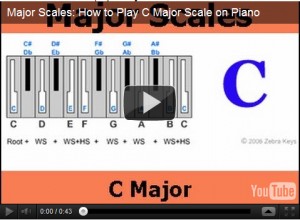 |
Scale
Group of notes that provide the material for songs. Western music is based on the 12 tone chromatic scale. Learn how to play C major scale.
Sharp
Musical symbol indicating that a note should be raised one half step or semitone.
Sixteenth Note –
A note that gets a sixteenth of the beat of a whole note. In other words, 16 sixteenth notes fit into a duration of one whole note.
Staccato –
Playing the notes very short as if the keys were hot to the touch. Notes played with staccato have a dot below or above it.
Staff –
Five lines and four spaces that are used as the framework on which musical notation is written.
T
Back to TOP
_________________________________________________
Group of notes that provide the material for songs. Western music is based on the 12 tone chromatic scale. Learn how to play C major scale.
Sharp
Musical symbol indicating that a note should be raised one half step or semitone.
Sixteenth Note –
A note that gets a sixteenth of the beat of a whole note. In other words, 16 sixteenth notes fit into a duration of one whole note.
Staccato –
Playing the notes very short as if the keys were hot to the touch. Notes played with staccato have a dot below or above it.
Staff –
Five lines and four spaces that are used as the framework on which musical notation is written.
T
Back to TOP
_________________________________________________
|
Learn How to Read Music Time Signatures and Note Durations |
Tempo
The rate and speed of the of musical composition.
Time Signature
A number (3/4, or 4/4, etc.) that immediately follows the clef sign and key signature. This number indicates the timing for a song. The top number indicates how many beats are in each measure, and the bottom number indicates what note gets one beat.
For example, if a music is written in 4/4 time – it has four counts per measure. If it is written in 3/4 time – it has three counts per measure. In both cases, the bottom “4” indicates that a quarter note gets a beat.
Tone –
A sound with a particular pitch. Tone is often used interchangeably with note.
Treble Clef –
Musical symbol that is placed at the left side of a staff that makes a note placed on the second line from the bottom of the staff the G above Middle C. For this reason, it is also called the G clef.
V
Back to TOP
_________________________________________________
Voicing –
Refers to the way notes that are played together are arranged and placed. For example, if you play C, E, and G of the C major chord, you could play C, E, and G close together, or space them out on the piano keyboard.
W
Back to TOP
_________________________________________________
The rate and speed of the of musical composition.
Time Signature
A number (3/4, or 4/4, etc.) that immediately follows the clef sign and key signature. This number indicates the timing for a song. The top number indicates how many beats are in each measure, and the bottom number indicates what note gets one beat.
For example, if a music is written in 4/4 time – it has four counts per measure. If it is written in 3/4 time – it has three counts per measure. In both cases, the bottom “4” indicates that a quarter note gets a beat.
Tone –
A sound with a particular pitch. Tone is often used interchangeably with note.
Treble Clef –
Musical symbol that is placed at the left side of a staff that makes a note placed on the second line from the bottom of the staff the G above Middle C. For this reason, it is also called the G clef.
V
Back to TOP
_________________________________________________
Voicing –
Refers to the way notes that are played together are arranged and placed. For example, if you play C, E, and G of the C major chord, you could play C, E, and G close together, or space them out on the piano keyboard.
W
Back to TOP
_________________________________________________
Whole Note
Note that gets four beats in 2/4, 3/4, and 4/4 time.
Back to TOP
_________________________________________________
Note that gets four beats in 2/4, 3/4, and 4/4 time.
Back to TOP
_________________________________________________
|
Note Durations How to Keep Time in Music Learn Basic Music Notation |
| ____________________________ |
| You May Also Like: |
|
Free Piano Basics Lessons Lesson 2 Names of White Piano Keys  Lesson 3 Names of Black Piano Keys 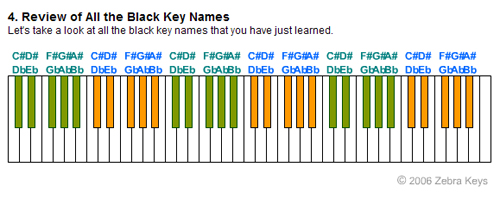 Lesson 4 Piano Grand Staff Lesson 5 Note Durations  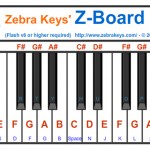 |
Free Piano for Beginners
Lesson 7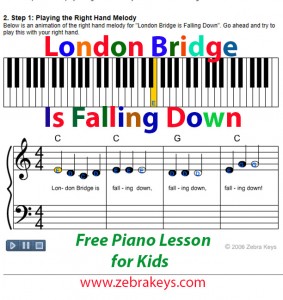 |
Lesson 6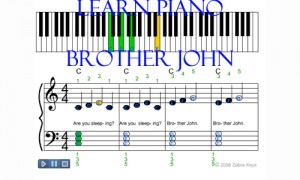 |
Lesson 8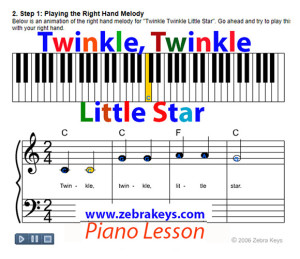 |
Lesson 11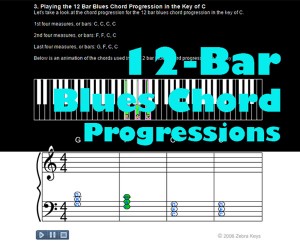 |
Lesson 9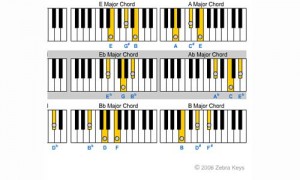 |
Lesson 10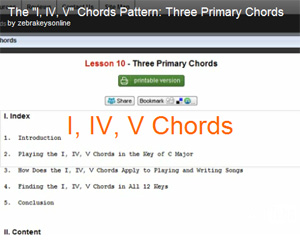 |
Lesson 14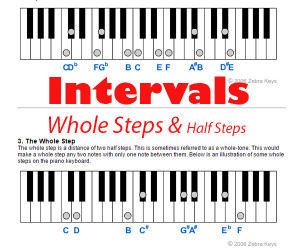 |
Lesson 12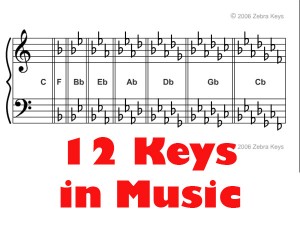 |
Lesson 13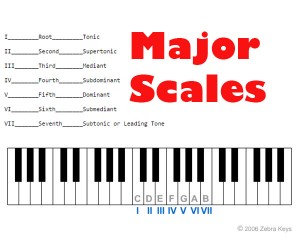 |
Lesson 16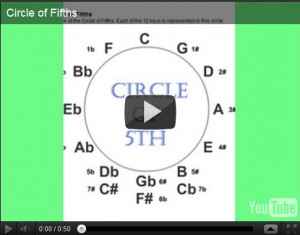 |
Lesson 17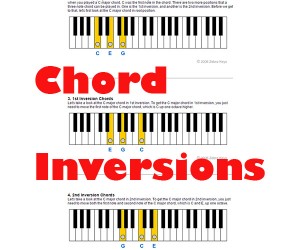 |
Lesson 15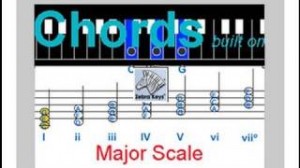 |
Lesson 18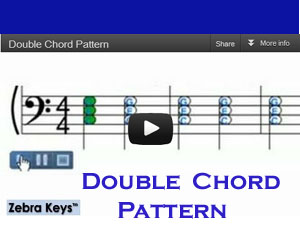 |
Lesson 20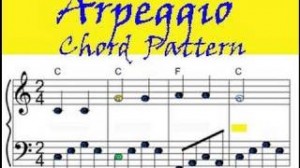 |
Lesson 19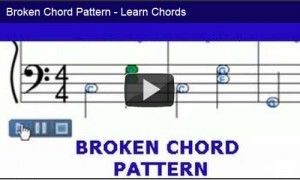 |
Lesson 21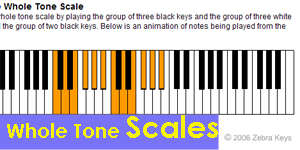 |
Lesson 22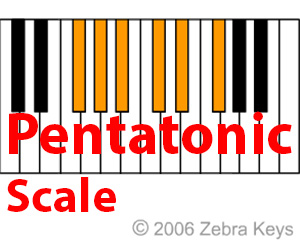 |
Lesson 23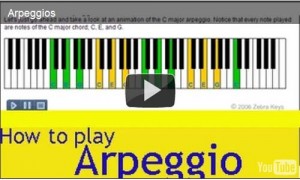 |
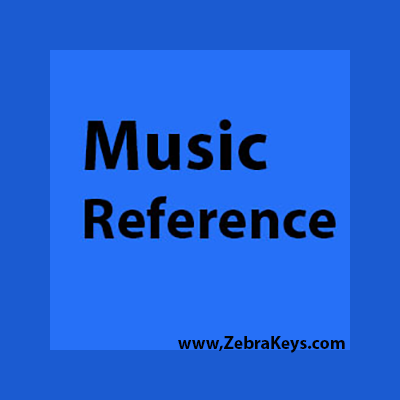 |
 |
 |
 |
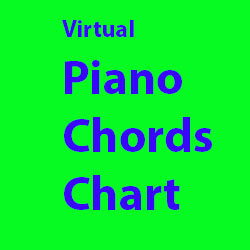 |
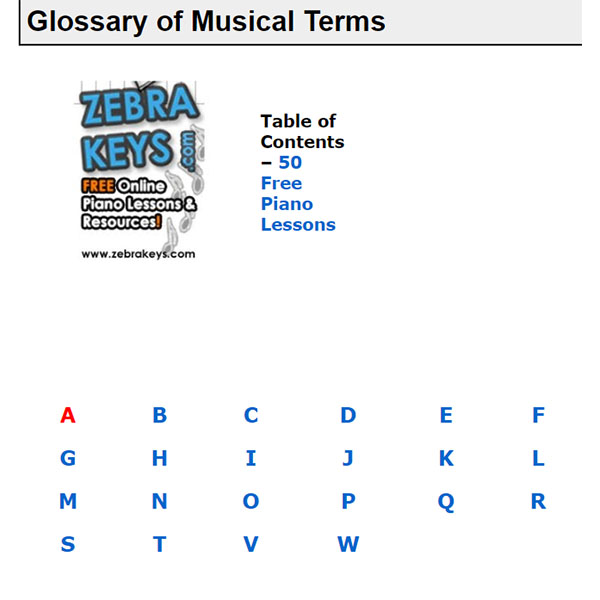 |
| ____________________________ |
| Click below to access: |
| Page 1 | | | Page 2 | | | Page 3 | | | Page 4 | | | Page 5 |
| Page 6 | | | Page 7 | | | Page 8 | | | Page 9 | | | Page 10 |
| Page 11 | | | Page 12 | | | Page 13 | | | Page 14 | | | Page 15 |
 |
Learn for Free – Online Piano Lessons
| 1 | | | 2 | | | 3 | | | 4 | | | 5 | | | 6 |
| 7 | | | 8 | | | 9 | | | 10 | | | 11 | | | 12 |
| 13 | | | 14 | | | 15 | | | 16 | | | 17 | | | 18 |
| 19 | | | 20 | | | 21 | | | 22 | | | 23 | | | 24 thru 50 |
|
|